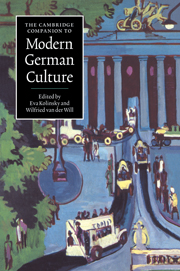Book contents
- Frontmatter
- In search of German culture: an introduction
- 1 The citizen and the state in modern Germany
- 2 German national identity
- 3 Elites and class structure
- 4 Jews in German society
- 5 Non-German minorities, women and the emergence of civil society
- 6 Critiques of culture
- 7 The functions of 'Volkskultur', mass culture and alternative culture
- 8 The development of German prose fiction
- 9 Modern German poetry
- 10 German drama, theatre and dance
- 11 Music in modern German culture
- 12 Modern German art
- 13 Modern German architecture
- 14 German cinema
- 15 The media of mass communication: the press, radio and television
- Index
In search of German culture: an introduction
Published online by Cambridge University Press: 28 May 2006
- Frontmatter
- In search of German culture: an introduction
- 1 The citizen and the state in modern Germany
- 2 German national identity
- 3 Elites and class structure
- 4 Jews in German society
- 5 Non-German minorities, women and the emergence of civil society
- 6 Critiques of culture
- 7 The functions of 'Volkskultur', mass culture and alternative culture
- 8 The development of German prose fiction
- 9 Modern German poetry
- 10 German drama, theatre and dance
- 11 Music in modern German culture
- 12 Modern German art
- 13 Modern German architecture
- 14 German cinema
- 15 The media of mass communication: the press, radio and television
- Index
Summary
The divided culture
On 10 May 1933, the Association of German Students staged the burning of more than twenty thousand books in the square in front of Berlin's opera house. Like all National Socialist acts of allegedly spontaneous public violence, the burning of the books was carefully orchestrated. As they flung works of named writers such as Heinrich Mann, Erich Kästner, Sigmund Freud, Karl Marx, Erich Maria Remarque, Kurt Tucholsky and Carl von Ossietzky into the flames, and before they let everyone join in the destruction, nine specially selected 'callers' pronounced what they expected from a culture they would regard as German. Their declamations sounded like a litany of anti-modernism: 'Against decadence and moral decay! For decency and propriety in family and state!' 'Against anti-German views and political treason, for devotion to people and state!'
The cultural cleansing by the student ideologues of 1933 highlights more sharply than any other event in the history of German culture the rifts that have divided it. These manifested themselves well before the First World War in a division between cultural traditionalism and modernism. The year 1896, for instance, saw the erection of the Kyffhäuser memorial commemorating Frederick II, also known as Barbarossa, a medieval emperor and the subject of a myth of resurrection and national unification. In 1913, the Völkerschlachtdenkmal, a monumental structure near Leipzig, celebrated the victory over the French one hundred years earlier as the onset of German national unification.
- Type
- Chapter
- Information
- The Cambridge Companion to Modern German Culture , pp. 1 - 19Publisher: Cambridge University PressPrint publication year: 1999
- 1
- Cited by



